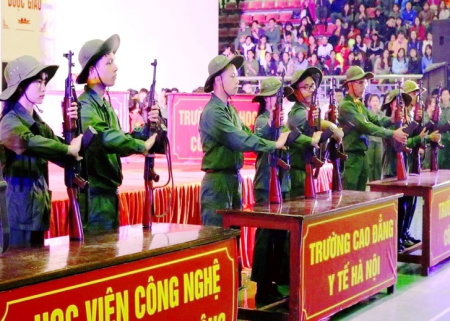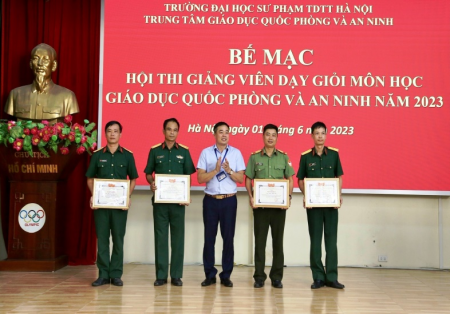Enhancing the efficiency of education and training at the National Defence and Security Education Centre at Hanoi University of Physical Education and Sports
National defence and security education for pupils and students is a major policy of our Party and State, aiming to equip the future owners of our nation with fundamental principles regarding national defence and security as well as essential military knowledge and skills, thus fostering a sense of national pride and identity and raising the awareness and responsibility among them in the cause of national defence. Presently, this task confronts new challenges and difficulties that cannot be underestimated, especially the adverse influence of the market economy, new developments in social life, and the fierce subversion of hostile forces with cunning plots and tricks. Notably, these adversaries take advantage of scientific and technological advancements, as well as social media platforms, to propagate and disseminate erroneous and reactionary viewpoints and ideologies that gradually affect the perception, thoughts, and feelings of students - subjects in the process of perfecting themselves in terms of character, knowledge, life skills, etc. In full cognisance of this and in accordance with the assigned responsibilities and tasks, the National Defence and Security Education Centre (NDSEC) under Hanoi University of Physical Education and Sports (HUPES) has consistently pursued innovation and improved the quality of national defence and security for students, delivering tangible results. In the academic year 2022 - 2023 alone, the NDSEC conducted training for 12 courses, awarding completion certificates for national defence and security education programmes to over 26,100 students, of which nearly 50% achieved good or excellent results, ensuring absolute safety. These efforts were commended by the Ministry of Education and Training and the People’s Committee of Hanoi with a Certificate of Merit.
 |
| Students practise assembling riffle |
To achieve these results, the NDSEC has consistently grasped the Party’s directives and resolutions, legal documents, and higher echelons’ plans and instructions concerning national defence and security education. The focus is on Directive No. 12-CT/TW, issued on May 3, 2007, by the Politburo (10th tenure) on enhancing the leadership of the Party over national defence and security education in the new context, Decree No. 139/2020/NĐ-CP issued on November 27, 2020, by the Government and various plans and instructions established by the Hanoi Council for National Defence and Security Education. Building upon this foundation, the NDSEC formulates and issues directive and managerial documents tailored to the practical conditions. The NDSEC organises thorough dissemination to ensure that its officers, lecturers, and staff are fully aware of the significance and role of national defence and security educations for students. Besides, they can firmly grasp the goals, requirements, and assigned tasks as well as the advantages and challenges to foster a unity of purpose and action and to instil a high degree of motivation, responsibility, and determination in the execution of their assigned tasks.
National defence and security education for students is a highly specific subject while students are increasingly well-informed with comprehensive knowledge and a rapid assimilation of multidimensional information. Therefore, to enhance the quality of education, the NDSEC places significant emphasis on building and nurturing a well-qualified and sufficient team of lecturers. In tandem with proactive efforts in terms of planning, training, and deployment of its officers and lectures, the NDSEC regularly reviews and advises the University’s Party Committee and Board of Directors regarding the balanced allocation of personnel to attend training courses at schools and academies within and outside the army. In addition, the NDSEC recruits well-qualified lecturers with appropriate qualifications to consolidate the organisation according to the new payroll schedule. Concurrently, the NDSEC intensifies training sessions, sports events, and professional competitions. It also strictly maintains the approval process for teaching plans, lectures, and instructional practices at all levels. Furthermore, the NDSEC organises teaching demonstrations, instructional evaluations, sample lectures, and experience-sharing sessions as well as instructional methodology activities within departments and faculties in order to train, refine, and enhance the lecturers’ expertise, skills, and teaching methods. On a yearly basis, alongside the deployment of officers and lecturers to training courses organised by the Hanoi Capital Command and the Department of National Defence and Security Education, the NDSEC conducts in-house training for 100% of its staff at various levels. The focus of training content is on the application of information technology, the use of educational and student management software, and training programme administration. Additionally, it includes updates on new knowledge and regulations, as well as measures to address the weaknesses and limitations identified in the previous academic year. Throughout this process, the NDSEC places a strong emphasis on harnessing the role of its officers and lecturers as seconded army officers in cultivating knowledge, experience, and military skills, such as team command movements, techniques, infantry combat tactics, etc. On the other hand, the NDSEC encourages its officers and lecturers to actively engage in scientific research, promote innovative thinking, and participate in teaching excellence competitions at all levels. They are also encouraged to proactively research, gather, and update new information related to national defence and security, thus orienting students’ thinking and understanding. Through these measures, the competence and qualifications of officers and lecturers have progressively improved. All lecturers at the NDSEC now possess a university degree or higher, meeting the teaching requirements for both immediate and long-term courses of study.
To address the challenges and inadequacies arising from incomplete teaching materials and curriculum, the NDSEC has directed its faculties to closely adhere to Circular No. 05/TT-BGDĐT issued on March 18, 2020, by the Ministry of Education and Training regarding the implementation of the national defence and security education programme in technical colleges, pedagogical colleges, higher education institutions, and newly published circulars and decrees. The NDSEC proactively conducts research and develops syllabi and lecture materials tailored to the specific training objectives. To ensure the quality of these materials, the NDSEC has selected officers and with outstanding expertise and extensive professional experience to participate in curriculum development and material compilation. Furthermore, the NDSEC leverages the role of the Scientific Council and invites leading experts and senior officers and lecturers from various military and civilian institutions within and outside the army to provide critical feedback, which serves as a foundation for necessary adjustments, supplements, and improvements. Thanks to these efforts, the lecture materials produced by the NDSEC are substantive and of high quality, earning commendation from the Hanoi Capital Command and the Department of National Defence and Security Education (Ministry of Education and Training). Additionally, the NDSEC is actively promoting digital transformation and the use of information technology. It creates numerous instructional videos demonstrating standard military team command movements and bed-making. These videos are published on the Centre’s main website and digital libraries, facilitating independent research of lecturers and students, and thereby contributing to the enhancement of teaching and learning quality.
 |
| Awarding teachers with outstanding performance at the defence and security teaching contest |
In addition to formulating content, curricula, and lecture materials, the NDSEC is actively innovating teaching methods and approaches. Based on the approved content, curriculum, and teaching plans for each subject, the NDSEC requires its officers and lecturers to thoroughly research the characteristics of students at each institution to tailor their teaching methods and approaches accordingly. The NDSEC emphasises the use of information technology, harnessing the effectiveness of its educational resources, website, and supplementary materials such as tapes and discs. Furthermore, it promotes interaction, discussion, issue-raising, and the connection between theory and practical application in each specialised field of study. The NDSEC places a high value on the transmission of knowledge, experience, and the military historical traditions of the nation. It firmly addresses the issue of monotonous teaching methods, the tendency to convey information one way, and mechanical, rigid instruction. With a strong determination and active engagement, the NDSEC has undergone significant innovations in its teaching methods, mitigating the rigidity in many subjects, thus igniting the enthusiasm and interest of students, fostering a lively learning environment, and contributing to the overall improvement of the teaching and learning quality. Particularly, the NDSEC attaches importance to renewing and enhancing the quality of extracurricular activities to create enthusiasm and a sense of experimental learning among students. The NDSEC has recently collaborated with the Ho Chi Minh Communist Youth Union, the University’s Student Association, and partner institutions to organise programmes such as “Students and Soldiers”, thematic exhibitions, talks by historical witnesses, military science film screenings, military skills competitions, student talent shows, cultural exchanges, sport activities, etc. These programmes have been well-received and highly regarded by successive student cohorts. Currently, a significant number of the University’s graduates go on to become teachers of physical education who also instruct national defence and security education in secondary schools. Therefore, in addition to the primary objectives of imparting basic knowledge of national defence and security and military skills, the NDSEC places a strong emphasis on training students in pedagogical skills and methods. This initiative contributes to the development of a pool of teachers for national defence and security education in secondary schools.
In pursuit of the goal to ensure that 100% of students undergo military-style training and experience the military environment while attending the national defence and security education course, the NDSEC has proactively overcome challenges related to facilities and provided centralised training and accommodation for students. Students are structured into squads, platoons, and companies. Besides, theoretical and practical lessons are organised with sufficient attendees as per regulations. Officers and lecturers are appointed as company commanders for direct management and leadership, while students take turns serving as platoon and squad leaders to oversee the unit according to the hierarchy. The NDSEC closely combines learning with military training and strictly maintains daily and weekly regimes, regulations on etiquette and manners, etc. to immerse students in a military-like environment. Furthermore, importance is attached to enhancing the quality of collaboration, particularly through the National Defence and Security Education Conference with higher education institutions and vocational colleges under the Ministry of National Defence’s guidance. This collaboration involves the exchange of experiences from various courses and academic years, ensuring uniformity in educational coordination, comprehensive management, and student training before, during, and after their time at the NDSEC. The Centre also collaborates with functional departments of the Ministry of National Defence to provide weapons and equipment as well as standardised uniforms for teaching and training purposes, creating a disciplined environment that fosters students’ self-discipline to study and practice. Surveys of student cohorts and feedback from partner institutions have shown significant transformations in students’ consciousness, responsibilities towards the collective, the development of self-discipline, organisation, and dedication in their daily activities and studies. Moreover, students have acquired enhanced knowledge, skills, and military capabilities through their education and training in national defence and security. These outcomes form the vital foundation and premise for the NDSEC at HUPES to keep up its efforts to improve the quality of education, maintain its reputation, and be recognised as a trustworthy institution for national defence and security education for students, thus contributing to the cause of national development and protection.
Senior Colonel, NGUYEN MINH TIEN, Deputy Director of the Centre